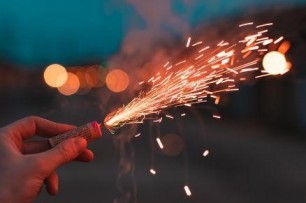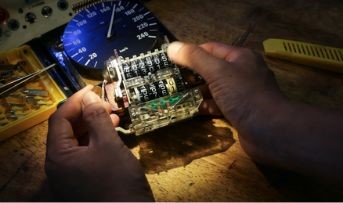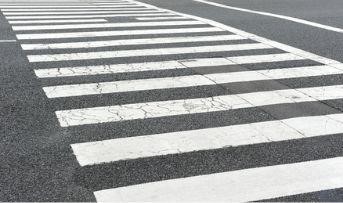General Insurance Blogs, Articles & Updates by - Magma HDI
Have us call you
- RENEW YOUR POLICY
- BUY NEW POLICY

These yoga poses can help you instantly burn your belly fat
Indians love having a high-calorie diet without balancing it with an equal workout regime. The direct result is the building up of belly fat. Inadequate sleep, hormonal imbalances, and our family history can also add to this problem. Most of us suffer from it and would surely want to get rid of that extra fat bulging out around our belly. The big question is how?
Yoga is the most straightforward answer to this problem, which is also great for your mind and soul.
Let us go through some yoga poses to help you instantly burn your belly fat.
1. Chakrasana:
Also known as the yoga wheel pose, it is a strong back-bending yoga asana in which your body takes the shape of a wheel. There are several advantages of this asana. It tones the abdomen by stretching the stomach muscles and helps lose belly fat. It strengthens and increases the elasticity of the spine. Also, it boosts your appetite and cures digestive problems. This yoga pose ensures that all your body organs function correctly and you become fit and healthy.
2. Baddha Konasana:
This asana is also known as the cobbler’s pose and is one of the simplest to perform. It stimulates your abdominal muscles, improves digestion, and burns belly fat while strengthening your knees and thighs. It helps open up the lower back area and relieves sciatica. This pose improves the overall health of the ovaries, prostate gland, kidneys and bladder.
3. Naukasana:
We also call this asana the boat pose. This asana can strengthen abdominal muscles, cure constipation and improve digestion. This helps to take care of belly fat while strengthening the arms, thighs, and shoulders. It improves blood circulation and is excellent for the back muscles. This pose stimulates the pancreas, kidneys and liver and is good for the prostate and thyroid glands.
4. Padahastasana:
A great asana to begin with, you simply need to stand straight and bend forwards to achieve the proper posture. This simple asana is excellent for the heart while burning your belly fat by putting pressure on it. It massages your digestive organs and cures constipation and indigestion. This pose stimulates the spinal nerves and tones them. It is also helpful for nasal and throat diseases. It is an excellent asana for increasing vitality and metabolism and boosting concentration.
5. Uttanpadasana:
This asana is good for taking away excess accumulated fat from your belly and hips region and toning it. It is beneficial in curing your back pain and improves the flexibility of your spine. It also strengthens your abdominal muscles and organs and improves the functioning of your reproductive organs.
Yoga is the perfect answer to help you burn belly fat. Moreover, yoga keeps your mind alert and fresh and has several other advantages for your entire body.
While practising yoga is an excellent way of keeping medical issues at bay, it may not completely prevent such occurrences. Therefore, buying a health insurance policy becomes necessary to take good care of yourself and your family during medical emergencies. It acts as a cushion and gives you comfort and backup when you or your family members need any expensive medical treatments. Choose the best health insurance company in India upon which you can rely blindly in times of need and stay safe.
Click HERE to buy insurance from the best health insurance company in India.
Disclaimer: The information provided above is for illustrative purposes only. To get more details, please refer to policy wordings and prospectus before purchasing a policy.

Steps to take care after a firecracker accident
We all have enjoyed either bursting firecrackers at the festival of Diwali or watching firecrackers on different celebratory occasions. They are mesmerising and create a view that holds the entire audience together. The beautiful patterns they generate in the sky, the vibrant colours, the sound, the light- everything livens up the vibe and brings happiness to people no matter where they might watch.
While firecrackers are a lot of fun to watch and play with, they are quite dangerous to handle. You need to be aware of the consequences they might have. But there are times when, due to no fault of your own or the designated person handling the crackers, you might have a minor or a significant slip-up and can get hurt. Are you looking for more information on how to treat such injuries after the entire episode? Go through the pointers below and find something to help you handle the injury better. Let's start!
1. Pat down gently:
If someone's clothes catch fire, you need to pat them down gently or roll them up in a blanket to avoid the fire from spreading to other parts of the clothes and the body. Using the blanket or patting them down cuts down the oxygen supply for brief moments, which would help dial down the fire. .
2. Check for burns:
Determine the level of burns the firecracker accident caused. Skin acts as a defence wall between the organs and the fire but if the layers of the skin are severely damaged, immediately rush to the hospital. If the burn looks manageable, clean the area using non-irritable antiseptic liquids and a soft cloth or cotton pad.
Once appropriately cleaned, apply burn-related ointments (for example, Neosporin) and let it dry or wrap the area lightly with bandages. If you are rushing to the hospital, it is better to leave the wound open.
3. Use water first:
Water helps cool down the burnt area, helps in relaxing, and gives a numbing break from the heat and pain. Wash the burnt site before you go ahead with the cleaning and the first aid procedure.
4. Burnt clothes can get stuck:
Fire accidents can cause your clothes to stick to your skin while they are on fire. Do not hurry and try to rip off the burnt part of the clothes. Chances are they are charred and stuck to your skin. Ripping them off like a bandaid might backfire as they can cause skin damage to the burnt area. This might further increase the injury level and cause bleeding and pain escalation.
5. How to treat the scarring:
Often, severe burns cause scarring on your skin, which can be difficult to eliminating. In such cases, you need to use some recommended ointments (refer to your dermatologist) and use an adequate amount of sunblock or sunscreen creams that will suit your skin type without adversely affecting your injuries.
6. Protect the burn from dust:
Dust particles might settle on the scab of your wounds or burns. While they might not noticeably cause damage to the skin if you don't have skin allergies. They can cause irritation and burning sensation as your skin is quite damaged, and the external layers might have worn off due to the injury.
It would be best if you were extremely careful around firecrackers. No matter how much fun they are to watch and play with, a certain degree of safety has to be maintained to avoid accidents. The tips mentioned above were some steps to take care of after a firecracker accident. You need to be watchful about your safety. Get a personal accident insurance policy for yourself and your loved ones to add a layer of protection against these mishaps and stay stress-free monetarily. Enjoyment is necessary, but not at the expense of risking your life. Stay safe while handling firecrackers!
Click HERE to learn more about the benefits of the personal accident insurance policy.
Disclaimer: The information provided above is for illustrative purposes only. To get more details, please refer to policy wordings and prospectus before purchasing a policy.

These smart tips can help you plan the most exciting long weekend trips
Hectic schedules have evolved into the new normal over time. The constant pressure to excel in various dimensions of life makes it challenging to take a moment out for yourself with an occasional break. For working professionals, no period is cherished more than a long weekend. The joy of a prolonged break from the monotonous daily life is a welcome change, during which many people plan to travel.
Long weekends allow you for short getaways with just enough time to visit places and plan shorter itineraries. Consider these quick tips to plan your solo adventure or family trip on the upcoming long weekends in 2023.
1. Identify a key interest:
Identifying purpose is an essential step in planning for any holiday. Due to time restrictions, satisfying some of your travel bucket list goals may only be possible. Therefore, pursue the top interests from your priority list. This may be nature observation, seeking the thrill of adventure, or a leisurely getaway. Identifying the purpose of the trip helps plan efficiently and narrow down choices of the destination and itineraries.
2. Plan your trip loosely:
We tend to do excessive planning to experience a perfect holiday. While that may help for more prolonged travel plans, tightly packing your schedules on long weekend trips often leads to disappointment. It is ideal to choose a couple of destinations or popular attractions to explore per day instead of allocating timelines to each activity.
3. Travel light:
Short trips often call for impulsive decisions on the move. Travelling with required luggage instead of excess will help you travel quickly at the spur of the moment without considering modes of transportation. Consider choosing backpacks instead of conventional trolley bags.
4. Make reasonable budgets and plan accordingly:
Travellers often underestimate the expected expenditure of trips, irrespective of duration. Analyse your finances before making decisions and set clear limits for budgeted costs. This way, you can plan accordingly without letting your finances take a hit and don't have to compromise on the experience!
5. Consider immersive travel:
Experiencing an unknown culture is the best break from your routine. Immersive travel is slowly gaining popularity as tourists shift their priorities from extravagant, luxurious trips to authentic, local exposure. These trips do not require excessive planning or budget and will leave you with memories that last a lifetime.
Additionally, ensure to get a general insurance online quote if you don't have the policy to cover any accidents that may occur while travelling.
6. Explore your alternatives while booking:
We advise planning for your long weekend trip in advance to avail the best deals on accommodation, commute, and activities. Booking facilities at the eleventh hour often means paying inflated prices due to the high demand for hotels. Use online price comparisons for hotels and excursions to get the most significant value for the cost.
7. Make use of your time efficiently:
We get it; being on vacation means steering clear of routines and alarms. However, wake up early to experience destinations around nature, outdoor activities, and local explorations to make the most of your long weekend. But if you're on a leisurely break, feel free to sleep and replenish your energy!
The perfect long weekend trip does not require excessive planning. Consider the above tips, and get a general insurance online quote to protect yourself and your loved ones to plan the most rewarding weekend trips. With multiple long weekends coming in 2023, get ready to ignite the traveller within you. Create a flexible itinerary focused on your interests without stressing over time- and you have an ideal travel plan customised just for you!
Click HERE to get the best general insurance online quote.
Disclaimer: The information provided above is for illustrative purposes only. To get more details, please refer to policy wordings and prospectus before purchasing a policy.

Let's understand how personal accident insurance can be beneficial for sports players
India is known to be a country full of diehard sports enthusiasts. Indians have a massive fanbase for cricket, badminton, tennis, and hockey players, to name a few. Over the years, as interest in sports has picked up, so has the interest in participation. While our international representation in renowned championships has grown, so has the focus on sports in schools. Presently, there are several opportunities for people of varying ages to explore various sports at their convenience and budgets.
One common risk in most sports is the occurrence of accidents. While sports require a certain level of competitive spirit and fierceness, it must be done carefully to avoid injuries. Be it minor or significant- an accident can alter a sports person's life and future opportunities. Besides the fun and excitement, safety is the most crucial aspect of sports.
Since accidents can occur to people involved in sports, purchasing a personal accident cover is advisable. In addition to it, sports players should put in extra effort to find the best personal accident policy in India to cover any costs allied with accidental injuries or death.
What is covered under personal accident insurance?
A personal accident policy covers medical costs that arise due to accidents. Accidents in sports are inevitable and often result in high medical expenditure. Purchasing a plan that covers the cost of hospitalisation and compensates the insured or the legal heirs in case of partial or permanent disabilities is prudent. While the formerly stated patients receive periodic pay-outs, the policyholder's family who dies due to an accident is entitled to a lump sum payment.
It also covers medical bills for frequent accidents like burns and fractures, legal processing, funeral, and child education expenses if opted for as an add-on to the policy.
Insurance policies have evolved over the years to include injuries occurring due to sports, except for adventure sports, which have more significant risks and mortalities. Upon closer observation of the fine print of the best personal accident policy in India, you may find that participating in any dangerous sports activity is not covered under the policy. Therefore, sportspersons need to raise questions and get clarity regarding what is included and what is not in their accident cover to ensure that their claims do not get rejected.
The need for sports players to purchase personal accident insurance:
With the increasing interest in sports over the years, especially after the pandemic, more people are inclined towards pursuing sports as a fitness hobby or career. Being fit is the new trend, and the easiest way to do so is by engaging in a sport you like as a hobby. Whether you are a newbie to the activity or an experienced athlete, the risk of accidents is ubiquitous for all sports persons engaging in strenuous sports
Since accidents come unannounced, sports enthusiasts must research and find the best personal accident policy in India to derive the most significant benefit. If selected right, there are several benefits of an accident insurance policy. It provides coverage against any liabilities arising from the accident in the form of hospitalisation costs and loss of income for a stipulated period. It may even cover your children's education fees if provided. A key feature is the provision of compensation for disabilities, in which case the insured is entitled to receive a lump sum amount.
Therefore, with due diligence, sports persons can easily discover the best personal accident policy in India to cover potential accidents and compensate them or their families for damages arising from such accidents. Injuries are a part of the journey of a sportsperson. Rather than running away, they must face it and conquer every fall to achieve success one day!
Click HERE to buy the best personal accident policy in India.
Disclaimer: The information provided above is for illustrative purposes only. To get more details, please refer to policy wordings and prospectus before purchasing a policy.

Why is it important to practice defensive driving, and how can it benefit you
Defensive driving is the technique in which you drive cautiously and smoothly, minimising the chances of engaging in an accident and damaging your car and that of third parties. Car accidents mainly occur due to reckless and rash driving. A defensive driver ensures that he drives carefully so that he does not engage in a collision.
Let us see why it is important to practice defensive driving and how it can benefit us.
1. Safety and security:
Defensive driving is necessary for your safety, security, and other vehicles on the road. Moreover, it can also save pedestrians around your vehicle from injuries and loss of life. It is an art that comes with planning and regular practice. You need to scan your surroundings and be alert while slowing down or changing lanes so that you do not collide with other cars on the street. A defensive driver believes that other drivers on the road can commit a mistake anytime while driving. Hence, he practices being perfect and better than them to leave no margin for errors.
Accidents prove very costly as you will have to get your car repaired if you meet with an accident. Raising an insurance claim for minor repairs is not advisable as you might lose on your NCB (No-claim Bonus). You will have to bear the cost of repairs and maintenance and the loss of time and effort spent on repairs. There is a high risk of loss of lives and valuable property in case of a severe accident. If you are a defensive driver, you can avoid such situations and practise disciplined driving.
2. Better mileage:
The most common reasons for poor mileage in a car are accelerating abruptly and driving in the high rpm range. You can go fast and enjoy the speed but will burn a lot more fuel and experience poor mileage in return.
A defensive driver always drives at a controlled speed, accelerates softly and maintains an economy rpm range that gives the best possible mileage. Also, he ensures that he does not brake abruptly and changes gears frequently. This helps to save on fuel costs and also prevent accidents due to over-speeding.
3. Low maintenance cost:
A defensive driver drives cautiously and with care to avoid getting hit by another vehicle. Because accidents pose a huge threat of scratches, dents, rubs, etc., on the vehicle that requires an immediate fix. Your car wouldn’t require frequent servicing because of your cautious driving style. You can benefit a lot from the low cost of maintenance and repairs.
4. Fewer traffic challans:
A defensive driver ensures that he does not skip red lights on crossings, over speeds, or enters a one-way road negligently. He is a vigilant and responsible driver. Hence, it is important to practice defensive driving as you will get none or very few traffic challans and save a lot of money and time.
Defensive driving is a skill that can be developed with constant practice, and by promising ourselves that we will not engage in brawls and fights on the road. Also, you must avoid changing lanes frequently, use proper and timely indicators and signals, and stay away from distractions such as the mobile phone while driving.
Good car insurance will benefit you in several ways. It takes care of your safety and security and helps you save on unnecessary repairs and maintenance expenditures in case of an accident. Also, you don’t need to go through emotional trauma and monetary loss if your car gets stolen, as your comprehensive insurance policy will take care of the financial loss and reimburse it. Buy car insurance online and stay stress-free by having a reliable safety net for your vehicle.
Click HERE to buy car insurance online to protect your valuable asset from damage.
Disclaimer: The information provided above is for illustrative purposes only. To get more details, please refer to policy wordings and prospectus before purchasing a policy.

Mileage tampering: How to detect tricked odometers used in the cars
India’s passenger-automotive industry was valued as the third-largest globally in 2022. While the market for new cars is predicted to grow at a higher rate in 2023, not all Indian consumers are covered under this segment and belong to relatively lower economic strata characterised by lower disposable incomes. Such buyers drive demand for second-hand or used cars.
Expected to grow at a CAGR of 15%, the Indian used car market is not to be undermined. With global economic conditions' uncertainty, making prudent choices such as buying second-hand cars and purchasing online car insurance is expected to continue. While you can derive significant value from pre-used vehicles, the chances of getting scammed are also higher in case of negligent inspection. Odometer tampering is a prevalent form of cheating that you must beware of while purchasing a used car.
Here’s all you need to know about tampered odometers and tips to detect them.
Defining mileage tampering.
An odometer is a device that measures the usage of a car in terms of the distance it has run. It is calculated based on the wheel's rotation, which depends on its perimeter.
Mileage tampering, or odometer fraud, is a common trick car dealers use to persuade buyers to purchase old and well-used cars. Practised for various reasons, rolling back an odometer is an illegal act done to get a better price by selling a used car.
The issue with odometer fraud.
1. The inflated price of used cars:
By misrepresenting the car’s present condition, car dealers trick buyers into believing that the vehicle is relatively unused and sell them the used car at a higher price.
2. Safety issues:
Apart from the price of the vehicle, it also raises safety concerns. A car that has been used for a long while is sure to have accumulated miles and been through its fair share of harsh weather, rough terrain, and occasional accidents. All these factors are likely to adversely impact the vehicle's internal components and body frame, making it unsafe in the long run.
3. Insurance fraud:
Buying a used car with a rolled-back odometer may put you at risk of online car insurance fraud. While you may not have intentionally misrepresented facts and may be the victim of a tampered odometer, insurance companies see facts at face value and do not consider earlier activities. Therefore, it becomes essential for you to declare genuine and accurate mileage figures related to your car while buying online car insurance to ensure raising a successful claim when needed.
Tips to avoid odometer fraud.
1. Check the service records:
Before committing to purchase an old car, ensure that you check the maintenance records. Missing entries and figures that don't match are a sign to look out for.
2. Inspect the car body:
Check if the car's physical condition aligns with the story represented by the odometer. A worn-out, dent-ridden, paint-scratched vehicle is bound to have been on the roads for longer than one in pristine condition.
3. Look under the steering:
What are some key giveaways of a well-used car? It's the accelerator, brake and clutch! The groove depths of the pedals can indicate the usage of the vehicle and help detect odometer fraud.
4. Check the odometer:
While there are no tell-tale signs, the naked eye can identify a poorly done tampering job. This could be in the form of ill-fitted modifications and off-sounding odometer mechanisms.
5. Experts know best:
If you're sceptical, asking for an expert’s evaluation is best. This way, analogue or digital odometers can be thoroughly inspected for tampering attempts.
Odometer tampering is widespread and spares neither digital nor analogue devices. In such cases, one must always exercise caution and take necessary precautions to detect issues before signing the dotted line. Additionally, continue your prudent streak and purchase online car insurance to protect yourself from the financial losses from car accidents.
Click HERE to buy online car insurance.
Disclaimer: The information provided above is for illustrative purposes only. To get more details, please refer to policy wordings and prospectus before purchasing a policy.

The need and benefits of automation for a convenient life at home
Technology is everywhere, and the world has already seen the drastic changes that technology has brought with it. Some hundred odd jobs are expected to be extinct in the next ten years because of the intervention of technology. But what are your benefits? Can you use technology to make things easier for you? These are only some of the many questions that people keep wondering about.
This article will help you understand a small aspect of the tech world that will immensely contribute to your daily life and why you must consider getting your hands on them immediately. Today, we will discuss home automation and why it is a game changer for an urban household.
1. Being in command:
Do you not hate leaving your comfortable sleeping position just to turn off the lights? Well, what if a simple command could achieve that. With home automation, your voice or mobile is the only thing you need handy to get things done around your home. Be it controlling the lights, music, volume, brightness, or the AC. Everything can be made convenient and hassle-free at the convenience of your fingertips.
2. Better security:
Since all the devices, including your doors, are connected to your phone, you can have 24X7 surveillance of your home. Motion detectors, heat sensors, cameras, and automated locks are some of the straightforward home security solutions you can invest in. You can opt for security alerts when you are away from home in case of suspicious activities.
3. More comfortable:
Imagine walking home on a hot sunny afternoon, and you get home, turn on your air conditioner and wait for it to cool the room before you can rest. With home automation, you don’t have to worry about that anymore. You can use your mobile phone to turn on your AC while being miles away from home.
Not only that, if unexpected guests on your way home join you, you can command your home automation system to turn on the guest lights and AC so that your guests walk into a cosy and comfortable living space.
4. Energy efficient:
A programmable intelligent automation system can analyse your active hours and control lights, cooling, and music based on your everyday routine and suggests the most energy-efficient way of applying these to your routine. Such systems not only help in better managing the resources, but they also help you in analysing your daily habits. With home automation, you can keep a tab of everything and understand the energy consumption rate over time.
5. Monitoring kids and pets:
One of the most important benefits of home automation is keeping an eye on your kids or pets. In today’s day and age, both parents are working parents. Monitoring a child’s daily routine can become stressful while being away from home.
With the help of home automation, not only can you see your children, but you can also interact with them over video calls. The same goes for pets. Various kinds of food dispensers dispense food on time to your pets. These gadgets will help ensure that your kid and pet are happy, healthy, and safe.
These are a few reasons why home automation is a significant investment. Safety, convenience, and comfort are only some factors that make it a must-buy for your home. For an added layer of protection, buy general insurance online. Search for an ideal home insurance policy under the general insurance category to safeguard your home and your family against any potential dangers. Get the best deals online and invest in a secure future of your most important asset.
Click HERE to buy general insurance online.
Disclaimer: The information provided above is for illustrative purposes only. To get more details, please refer to policy wordings and prospectus before purchasing a policy.

Zebra crossing: Why most drivers often ignore it
Zebra crossings worldwide provide pedestrians with a safe option to cross the roads amidst heavy traffic. While road rules might differ from country to country, the purpose of zebra crossing stays the same. When drivers see people waiting to cross the street at one end of the black-and-white stripes, they usually apply their brakes to allow pedestrians to cross the road.
However, unfortunately, most drivers tend to ignore the zebra crossing, nullifying the purpose and putting the safety of pedestrians at risk.
Skipping the zebra crossing deprives pedestrians of the chance to cross the road safely. And being ignorant on the road isn't just a threat to pedestrians; it also puts your vehicles at a high risk of damage. To avoid landing in such trouble and causing significant damage to your car, you must follow the traffic rules strictly and consider getting car insurance India to prevent monetary stress in unprecedented situations.
Where does the problem lie?
Many drivers don't obey traffic lights and make an emergency stop over the zebra crossings, making it hard for pedestrians to use the approved crossing path on roads that are already crowded. Surprisingly, although zebra crossings are present at busy intersections, traffic officials are somehow lenient toward automobiles occupying zebra crossings.
As a result, when attempting to cross the road, people frequently need to use their running skills to safely reach the other side without being hit by any vehicle. When the traffic lights malfunction, it becomes more challenging as the traffic is set loose.
Due to the chaotic traffic, school children wait several minutes to cross roads safely. Most kids assume that because they have learned about zebra crossing since they were little, cars will stop so that they may cross. However, the truth is different.
Unfortunately, many drivers don't know the importance of zebra crossings, and even the public works department doesn't care enough to paint them often. Public awareness campaigns on traffic etiquette are required.
Determining the requirement of a crossing.
Zebra crossings are used on roads with much traffic and where fewer people can cross the road at signal-controlled crossings. Many surveys of busy traffic intersections reveal that pedestrians find it extremely difficult to cross the road.
Also, personal injury accident data showed that most common accidents involving pedestrians happen at busy crossings.
If you're a pedestrian waiting at zebra crossings, then remember to:
● Give incoming traffic plenty of time to see you and stop before crossing
● Wait until both directions of incoming traffic have stopped or the road is clear before crossing
● Look for the traffic signals and avoid crossing in a hurry
If you're a driver, then remember to:
● Watch out for the traffic signal from far and accordingly prepare to halt
● Avoid halting over the zebra crossing and keep it clear for pedestrians to walk
● Never jump the traffic signal
Additionally, keep in mind that:
● Normal drivers tend to ignore crossings that are not frequently used
● Drivers require more time to manage their vehicles when the road is slick
● Cross the street only when the traffic is stopped
Drivers must keep all these things in mind while driving and follow the rules carefully to avoid collisions with pedestrians. Be responsible, follow traffic rules religiously, and avoid over-speeding on the roads. Prioritise your safety, fasten seat belts before beginning your journey, keep all the required documents handy, and purchase a valid insurance policy. Buy the best car insurance India not just because it is mandatory but more as a financial shield to protect you and your valuable asset in case of accidents.
Click HERE to buy reliable car insurance India.
Disclaimer: The information provided above is for illustrative purposes only. To get more details, please refer to policy wordings and prospectus before purchasing a policy.


